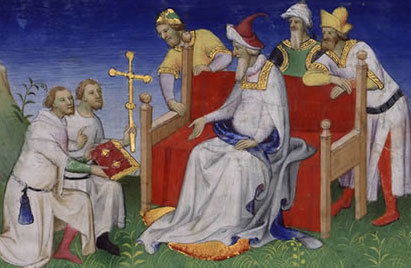
Khubilai Khan Greeting the Polo Brothers (detail)
Livre des merveilles, Bibliothèque nationale de France, Paris
The Mongols had a benevolent attitude toward foreign religions, or at least a policy of benign neglect.
Their belief in Shamanism notwithstanding, the Mongols determined early on that aggressive imposition of their native religion on their subjects would be counter-productive. Instead, they sought to ingratiate themselves with the leading foreign clerics in order to facilitate governance of the newly subjugated territories. They even offered tax benefits to the clerics of Buddhism, Islam, Daoism, and Nestorian Christianity in order to win the support of those religions.
A quintessential Mongol view of religion may be found in Marco Polo's writings. According to Marco Polo, Khubilai Khan said:
"There are prophets who are worshipped and to whom everybody does reverence. The Christians say their god was Jesus Christ; the Saracens, Mohammed; the Jews, Moses; and the idolaters Sakamuni Borhan [that is, Sakiamuni Buddha, who was the first god to the idolaters]; and I do honor and reverence to all four, that is to him who is the greatest in heaven and more true, and him I pray to help me."
For more on the Mongol rulers' policies of religious tolerance, see: • The Mongols in China: Religion under Mongol Rule • Key Figures in Mongol History: Chinggis Khan's Four Legacies